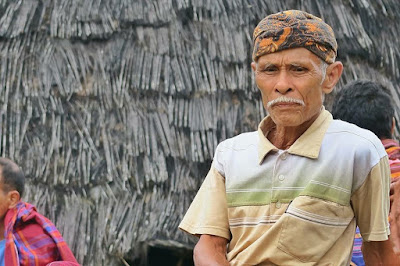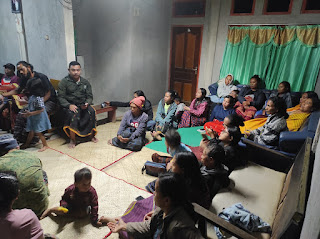Missing Fairy Tales from Grandma
 |
| Sofia Ngawul |
My mother and I had prepared our clothes, bread and water in my backpack. Blacky, my old-fashioned motorbike had been freshly repaired as its old fashioned problems had been so annoying. But now we were all ready to set off for the two and a half hour journey to visit my mom’s cousin who had been sick for a while.
One of the main things we could not forget to bring was the medicines we had bought based on the recommendations of the doctor, to carry to the Lumu, where my mother’s cousin had spent her life while suffering from diabetes.
All packed, we put on our face masks and helmets ready to leave Ruteng for Lumu.
When we were about to get on the motorbike, my Mom’s phone rang and she had to pick up a call from an unknown number. Within a few seconds I saw my mom’s face dropped and her eyes reddened. I immediately asked “What happened?” My Mom replied “She’s dead.” But who? I continued to ask. “Mama Esti” she answered, with tears dropping down her face.
It was so painful, but we comforted ourselves
in knowing it was the end of a very painful illness for Mama Esti. Now she
could rest in peace.
On hearing this news, I was immediately asked
by my Mom to buy one piece of sarong to take to Lumu for covering the corpse.
Meanwhile my mom was busy calling her relatives who were not in Lumu to inform
them of the sad news. Some of them were in Bali, and two of Mama Esti’s
children were in Kalimantan for work, but due to the Covid-19, all airplanes
and ships were not operating, preventing them from travelling to Flores to see
their mom for the last time.
Mom and I rode to Lumu hours later after we
got ourselves repacked and had lunch. During the ride my mom shared a lot
about her childhood. When she was five
years old her father died and her mother remarried, leaving her to be raised by
relatives. One of the relatives who helped her in growing up was Mama Esti. A
person who she thought a very kind person. A person who would always share
food, clothing and a room where my mom could sleep. Mama Esti was also a very
cheerful person, she liked to make people happy and have fun. “No wonder her
eight grandchildren used to play and spend time with Mama Esti”, my mom added.
When we reached Lumu village we could see the
people wearing their Manggaraian sarongs queuing to walk to the house of Mama
Esti. There was a tent set up in the front yard of the house where people were
seated. We could see people crying very loudly.
 |
| (source) |
After parking Blacky, my motorcycle, nearby, my
mom and I entered the house. My mom just couldn’t hide her sadness. She even
began to cry as she saw those who were walking to the house of Mama Esti. She
managed to utter a few words to express her regrets of not being able to visit
her when she was sick.
Bapa Rilon, one of Mama Esti's brothers shared
her story about Mama Esti when she was still alive. He said that as the eldest
child of a family of 10, Mama Esti was seen as a role model among her
siblings. She acted not only as a child but also like a parent who had a great
responsibility to take care of the family. She managed the family, she helped the
brothers to pay dowry to their wives, and she supported the education of
relatives, all acts that she did without questions.
Vendi, one of his sons voiced his sadness
over the loss of Mama Esti, saying a few words while crying to remind him of the
last days before his mother lost her breath. "The last few days before she
died, she struggled to carry my baby, she even went to work in the fields. She is a mother who worked very hard. She acted like she had no pain".
The relatives who heard this fell into deep
sadness and cried.
After praying and whispering the condolence
into Mama Esti’s ear, I took out my sarong bought from Ruteng to cover her
body. Afterwards, I went to the backyard of the house to get involved with the
people in digging her last resting place.
Funeral Rituals
Even though majority of the people are Catholic, people in Lumu and most villages in Manggarai practice Manggaraian traditions for taking the coffin to the grave. It is believed that before leaving this world and living in the afterlife, the dwelling place of the spirits of the ancestors, according to the traditional religion of the traditional community, unlike the beliefs of major religions such as Christianity, Islam, Hinduism and Buddhism the spirits of the dead still remain for some time with relatives who are still living in the world and are counted as family members of people who still live in the world.
The rituals that led by Rikus Onsi included few steps that mainly done in their old tradition. When all the relatives gathered around the corpse, except the two of her sons who sadly could not be there, the ritual to take the body to the grave, was begun.
He firstly greeted, with a bottle of Arak in
his hands, all the elder relatives were gathered around. He greeted the
brothers of Mama Esti as “Anak Rona” (Wife givers), “Anak Wina” (Mama Esti's sisters), “Ase
Ka’e” (the families of Mama Esti's husband), and “Ase Ka’e Pang Olo Pepa Musi” (neighbors from surroundings).
After the ritual greeting, he then took a
chicken and a pig as he moved on to the next step of the ritual for taking the
coffin to the grave.
A bottle of Arak in his right hand, a chicken
in his left, and with the pig tied up by the door, he worshipped by mentioning
the name Sofia Ngawul, the real name of Mama Esti, in order to get her body
covered by coffin in the “Pekak Paku”,
or nail ritual, in which all the representatives including her children took
part in nailing the coffin shut, along with giving their messages to Mama Esti
in order to rest in peace, and pray for all the families she has left behind.
After “Pekak
Paku”, the speaker, Bapa Rikus, continued on to the next step of the ritual
called “Po’e Woja Latung” which
literally means to hold on to rice and corn. This aims in order that Mama Esti
did not take with her the belongings, but they should be left behind to the
families who she had left.
According to Bapa Rikus, it was one of the most
important steps of the ritual that cannot be missed out. One of the reasons for
crop failures was held to be farmers not asking the spirits to look after the
fields and even more so if people who passed away did not bequeath the land to
the children. Therefore, by doing the ritual, there would be two different
residences between dead and alive people.
When all the rituals were finished, the chicken
and the pig were sacrificed. A few men
stood to place the coffin on their shoulders, and the situation became
sorrowful.
Esti, the oldest child, cried for her mom not
to go away. She hugged the coffin and wanted to go with the men to the grave
but soon some people warned her not to do so. Carrying the coffin to the grave
was a task only performed by men. But she might visit the grave later after the
coffin had been buried. Meanwhile, the grandchildren of Mama Esti had not
stopped crying for almost the entire day.
My own tears began to fall when the oldest
grandson called out “tura kole ge ende”
(please tell more stories, Grandma). He already missed the stories that grandma
used to tell when he was going to sleep. The people who saw this could not hide
their feelings of sadness, but most agreed Mama Esti deserved a peaceful rest
after a long, hard-fought illness.
After the grave was covered with sand and cement,
the last person who was seen left at the back was Mama Esti’s husband who put
betel leaves on her grave and had his last words. “Hau ngai haun, aku ngai akun” meaning that he let her go on her
way, and he himself would go on his own way.
Sofia Ngawul passed away on June 26th 2020 at
the age of 60. She left a husband, three sons, two daughters and eight
grandchildren, who she was still attempting to take care of grandchildren near
the time of her death. She has physically left us but her good teachings remain
endless especially to her grandchildren and relatives.





Komentar